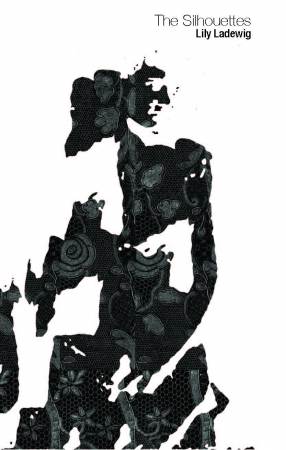|

Lily Ladewig
The Silhouettes
SpringGun Press
2012
$14
The first time I read this book I absolutely craved these poems, snuck them like candy in between errands and important conversations, on brisk walks between buildings or to my car, hiding them away like a secret that I wanted to keep out of pure vanity and self-interest.
The second time I read this book, nothing changed.
And so on.
To a certain extent all poems are persona poems, and the persona Lily Ladewig constructs is shy and seductive, strong and vulnerable, always ready to take flight. Sometimes these poems turn the most perfunctory statements into innuendo, as in, “These boxes are meant to be handled,” or, “Turn my body into a specimen. A blue-colored cocktail.” But as its title suggests, Ladewig’s debut full-length collection, The Silhouettes, is as much interested in the influence of the ineffable on the appearance of things as it is the actual appearances from which those forces vary. Concealment? Yes. But not at the expense of illumination. Quite the opposite. And the book’s structure pleasantly surprises. Ladewig has a natural tendency to dwell on something—a form, an image—just long enough and no longer. She sprinkles themes across the arc of the collection. One series contemplates various definitions of the word ‘silhouette.’ Another series, maybe the core of the book, is the “Shadowbox” series, a sequence of prose pieces presented in trilogies.
In fact, the “Shadowbox” series showcases Ladewig’s poetry at its best (and she’s often very good in other places). The poems work because they facilitate genuine intimacy and are yet strangely universal. Perhaps it’s the use of the second person pronoun: “I would pull this poem from you with my whole body. Beneath your bright palms my breasts might become a reality.” Accordingly, even imperatives read like warm invitations: “Let’s build a fire,” the first poem of the series begins, “A shifting location.” Their gestures swoon with the best teenage affectations still present in the most calloused among us: “I count the scratches on your back. I name them like ships.” Yet, despite its authority, it’s a voice as out of sorts as our own, as subject to doubt and quiet delusion. And that’s the key: “If I keep repeating what I think I should want,” one of the poems argues, much as we’ve all argued at one time or another, “I might start believing it.” And you already know she has; she’s just not in denial anymore.
Finally, these poems haunt. They linger. Literally. And they tell you they’re going to linger. It’s an arresting experience to listen to a poem relay its bare intentions to you and to know the poem will accomplish them swiftly and in ways you couldn’t imagine. Hints of surrealism fuel a narrative like “I Saw a Voice Outside My Window.” “It moved,” the poem begins, “I put on my coat and snow boots / to investigate.” What follows is dream-like without the logic of dreams, a character on an unexplained errand in pursuit of that elusive voice. The poem ends on a note of intentional ambiguity with the speaker alone in the woods by a river in winter eating a jam and cheese sandwich: “The little river was half frozen / and, Jesus, the apricot jam tasted so good. The voice / reappeared, but this time it was inside a body.” Whose body? The speaker? The ghost itself embodied, materialized? It’s a rhetorical question, instructive towards human and spiritual sensibilities alike.
“Apologia,” the book’s final poem, is another ghost story. Say you’ve moved into a new apartment in a new city. The old tenant begins to tell you all about your new home—its idiosyncrasies and idiosyncratic neighbors, the hustle and bustle of the borough. Then the conversation ends with a confession, a playful threat, which is a perfect way to summarize the promise of a book (and a poem) like this, as something that leaves its mark and leaves us wanting more in the best way possible:
Across the street is a brick house painted sky blue
and they’ve started stripping the paint but
you can watch the men at work all day
from the kitchen window. I’m sorry. I was lying
when I said that I was not dead.
I’m a ghost wearing my only dress.
You can find me in the perfume. You can
stare at your reflection in the microwave
and repeat my name until I appear.
If this first book is any indication, we’ll be repeating the name Ladewig for years.
--Jay Robinson
---
Jay Robinson is a Visiting Professor of English at Ashland University; he’s also taught Creative Writing and English Composition at The University of Akron. Along with Mary Biddinger, he’s Co-Editor-in-Chief of Barn Owl Review. Poems have appeared in 32 Poems, Anti-, The Laurel Review, and North American Review, among others. Prose has appeared in Poetry and Whiskey Island.
|
|

